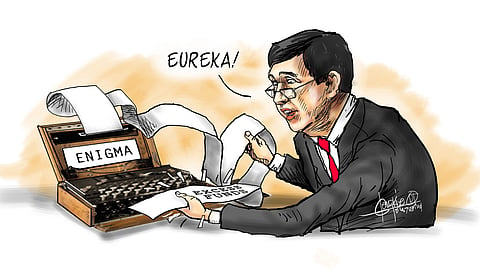Recto paradox
Finance Secretary Ralph Recto has created an enigma in the budget process, which he calls essential government projects under unprogrammed appropriations. Among projects that bloated the budget of the Department of Public Works and Highways (DPWH) from the original P821 billion to P996 billion in the final version of the 2024 General Appropriations Act were those that did not have feasibility studies.
An economist said the P175 billion insertions in the DPWH displaced projects through the manipulation of the bicameral conference committee in the budget process. This was part of the economic plan and was subsequently placed under unprogrammed items that the government will have to scrounge around for funds.
The bicameral conference is derisively called the “third” chamber which is composed of select members of the Senate and the House of Representatives tasked with reconciling conflicts in legislative bills.
The pork barrel, through the insertions, got priority ahead of the programs deemed essential to keep the economic momentum and maintain an inclusive society. The Department of Finance (DoF) recently issued a directive to look for funds for 11 “priority projects” that were under the unprogrammed appropriations portion of the 2024 budget worth P203 billion.
Department of Budget and Management records showed these projects were the government counterpart of foreign-assisted projects worth P51.7 billion; personnel benefits, P27.6 billion; Public Health Emergency Benefits and Allowances for Health Care and Non-healthcare Workers, P27.7 billion; National Economic and Development Authority-Philippine Statistics Agency: Community-Based Monitoring System, P3.6 billion; payment of right-of-way, P3 billion; maintenance, repair, and rehabilitation of infrastructure facilities, P6 billion; Proposed Salary Standardization Law VI, P40 billion; fiscal support arrears for the Comprehensive Automotive Resurgence Strategy (CARS) Program, P415 million; support to the Barangay Development Program of the NTF-ELCAC, P6.5 billion; Department of Public Works and Highways’ various projects, P26.6 billion; and Revised Armed Forces of the Philippines Modernization Program, P10 billion.
The DoF had identified “excess funds” of P89.9 billion in the Philippine Health Insurance Corp. (PhilHealth) and P108.9 billion in the Philippine Deposit Insurance Corp. essentially to fund the pork barrel that became part of the budget.
Finance Secretary Ralph Recto, addressing a forum the other day, said that measures to source financing for public programs and projects “are always guided by the principle that the administration will never compromise the government’s ability to meet the primary needs of Filipinos.”
“Because that is our job at the Department of Finance — to raise money for the government in the most cost-effective manner and to make sure that it is most judiciously used and spent,” he said.
Amid the strong resistance of budget watchdogs and other civic groups to the reallocation of the PhilHealth funds, Recto’s office admitted that the directive to sweep the budget of “excess funds” came from Congress.
A DoF statement said Recto “shed light (at the forum) on the DoF’s move to heed Congress’ directives to collect the excess and unused funds of GOCCs (government-owned and –controlled corporations) to finance crucial government projects under the unprogrammed appropriations of the 2024 General Appropriations Act.”
Regarding PhilHealth’s “excess funds,” he said these were government subsidies, “unused, excess, and dormant in PhilHealth while taxpayers pay interest on them without anyone benefitting.”
UP School of Economics Professor Cielo Magno, however, said the inefficiency of PhilHealth resulted in the idle funds, adding that the health insurance agency has not fulfilled its mandate to include all Filipinos under the Universal Health Care Act.
PhilHealth’s subsidy was even reduced by P40 billion in the 2024 budget but the medical assistance allocation, which are doleouts to those seeking medical aid from government agencies and legislators, was increased.
“That money came from tax payments and Filipinos should not have to look for connections in government, suffer long lines and beg just to get assistance,” Magno said.
Suppose PhilHealth is performing its mandate of enrolling all Filipinos in the public health program and it is regularly paying hospitals their due, in that case, the public will be relieved of out-of-pocket healthcare expenses, she said.
Instead, the DoF has made a mockery of the healthcare system by retrieving the PhilHealth funds and putting them in discretionary allocations which it now claims will be used for welfare projects, among other things.
All that trouble Recto has to go through to ensure that legislators are well-greased and content.


